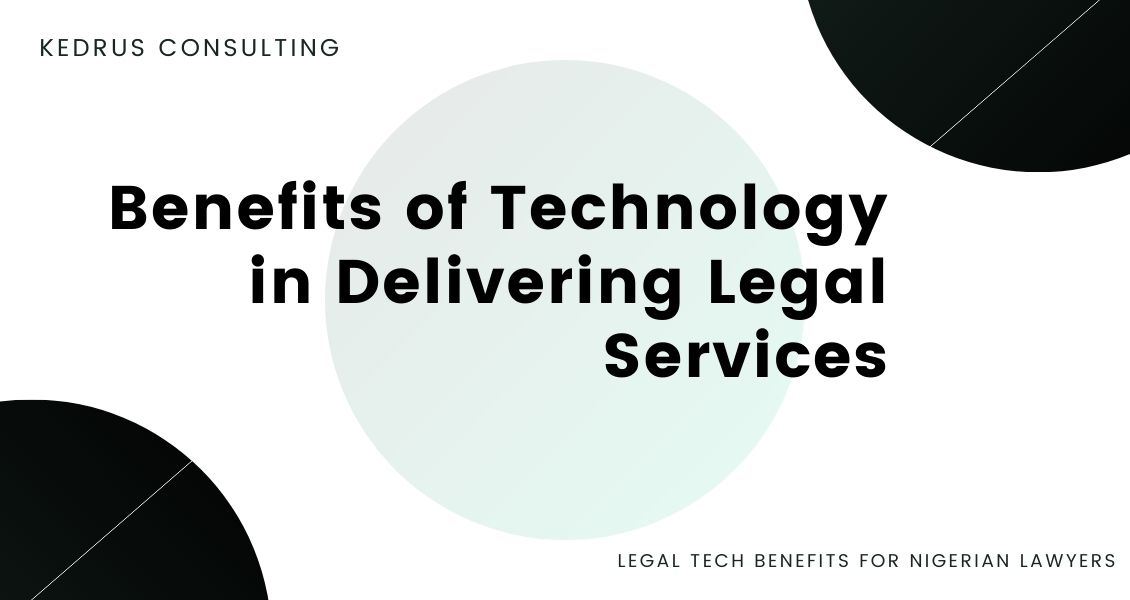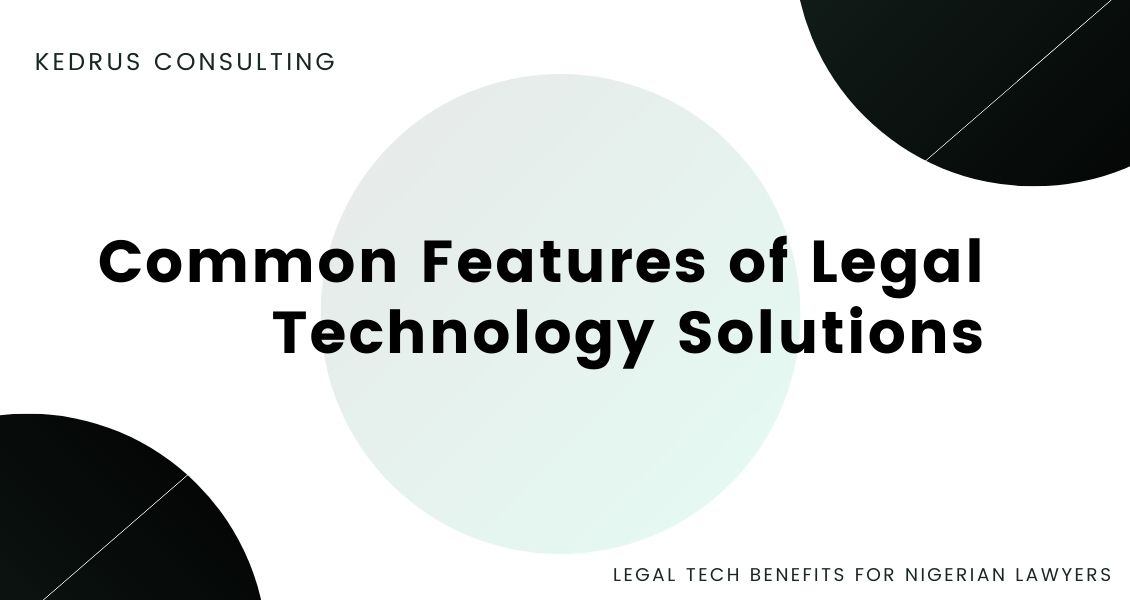Legal Tech And Its Benefits For Nigerian Lawyers
- May 20, 2021
- Posted by: Kedrus
- Categories: Digital Transformation, Innovation

Technology is the key driver of the fourth industrial revolution, with its impact penetrating almost every industry and sector. Advances in areas such as artificial intelligence, big data and analytics, machine learning, blockchain, and cloud computing are radically disrupting the traditional ways of doing business across every sector.
In the legal sector, advances in technology is disrupting the traditional ways of delivering legal services. Driven by the Covid 19 pandemic, a lot of law firms in Nigeria were forced to adopt digital technologies in their legal practice just as it happened across other sectors. Most courts across the country have now embraced virtual court proceedings and other digital channels to remain efficient and continue providing access to justice for the Nigerian populace.
Following this development, there has been an increasing adoption of legal tech within Nigeria’s legal sector. This term properly called Legal technology, refers to the use of technology and software to provide legal services and support the legal industry.
Traditionally, it entails the application of technology and software to help individual lawyers, law firms, and medium and large scale businesses with practice management, document storage, billing, accounting and electronic discovery.
Most of these legal tech solutions are designed to help law firms to acquire more clients, some of these technologies help law firms better serve current clients by helping the firm operate and provide legal services more efficiently.
We want to explore the diverse possibilities and potentials that these technology solutions provide the legal industry and how lawyers and law firms can effectively maximize these technologies to maintain a cutting edge while delivering value to their clients.
WHY LAWYERS SHOULD EMBRACE LEGAL TECH
Technology can make a lawyer’s life a lot easier, by assisting them to offer legal services to clients in a more faster and efficient way. This is why so many leading legal firms in Nigeria have already adopted relevant technology in carrying out key processes and activities within their organization. In today’s world, most clients prefer to work with lawyers and law firms that can demonstrate their ability to integrate technology in providing them with improved services.
Also, technology has proven to be effective in helping law firms acquire new customers and increase their customer base. This is made possible through CRM tools that provide better ways for law firms to manage relationships with their client base. Having capabilities that allow for centralized management of customer data and engagement gives the lawyer the opportunity to learn more about the customer and develop more efficient strategies of delivering value to them.
 BENEFITS OF TECHNOLOGY IN DELIVERING LEGAL SERVICES
BENEFITS OF TECHNOLOGY IN DELIVERING LEGAL SERVICES
Process Automation:
Most activities carried out in the legal sector are monotonous tasks. These are activities that can be easily replicated by software solutions that are programmed to carry out the same function. For example, tasks like setting up scheduled meetings, document management, or even legal time and billing can be fully automated and will help save lawyers a great deal of time which can be invested in more creative activities or tasks.
Collaboration:
Most law firms and in-house legal teams have never been provided with tools that allow for collaborative work with other human-facing departments of the organization. This has led to a great deal of inefficiency and loss of billable hours to avoidable errors and mistakes caused due to miscommunication. But with the development of new legal technology solutions, lawyers can now collaborate on tasks both amongst different legal teams and across departments within the organization.
Accessibility & Security
The legal profession is one that requires that due diligence be observed when handling client data and information. Contracts and other processes carried out by legal teams within most organizations must be protected against any form of breach and data leak. This is why it is absolutely necessary for law firms to adopt technology solutions that provide advanced security features and controlled access rights. These technology solutions allow lawyers and law firms to store their sensitive data on secure and reliable cloud hosting platforms. This will not only ensure top-level security but will also give lawyers the ability to access their data anytime, anywhere and from any device provided they are connected to an internet service.
Improved Customer Experience:
The success of most organizations is dependent upon the quality of experience they provide their customers. Law firms can leverage technology to both create and deliver improved customer experience for clients. Through advances in email marketing tools and UI/UX capabilities, lawyers can design exceptional experiences for customers. When a law firm begins to fall short in customer experience, it won’t be long before the customer looks to their competitor who is deploying the latest tools available for improved customer experience. Take, for instance, a law firm that has integrated a chatbot into its live chat feature on a website, they significantly reduce the time it would take for a customer to get a response to any query or question irrespective of when the customer initiates the conversation. This is a good way to improve customer experience. Customer satisfaction should be a top priority for law firms and technology can make this possible and more effective.
Improved Research Capabilities:
With the increased adoption of technology within the Legal sector, more startups are springing up offering online platforms where Lawyers can conduct legal research and legal analytics. This is made possible due to an increase in the number of cases, contracts, and other legal data that is being digitized and managed entirely online. With this, lawyers can now stay up to date with the law just with a click of a button.
COMMON FEATURES OF A LEGAL TECHNOLOGY SOLUTION
Contract Management:
Contract management or contract administration is the management of contracts made with customers, vendors, partners, or employees. Contract management includes negotiating the terms and conditions in contracts and ensuring compliance with the terms and conditions, as well as documenting and agreeing on any changes or amendments that may arise during its implementation or execution. Legal technology solutions help streamline the processes of contract creation, drafting, approval, and execution to maximize the efficiency in collaboration and reduce the time and effort spent during the process.
Legal Research:
Legal research is the process of identifying and retrieving information necessary to support legal decision-making. Legal technology makes conducting legal research easier than ever before. It helps legal practitioners search for authorities on any subject and get results in seconds, rather than the traditional days (even weeks of manual search). Most of the legal research platforms provide lawyers with an e-library full of thousands of legal reports as well as a search engine feature for easy navigation and search.
Document Management:
Legal technology helps lawyers manage documents efficiently. With a document management system, lawyers are able to receive, track, manage and store documents and reduce paper. Most document management solutions are capable of keeping a record of the various versions of a document created and modified by different users (history tracking).
Additionally, legal technology solutions help to simplify matter management. It helps legal teams get matter details organized, streamlines daily work and workflows, and allows legal practitioners to collaborate on top of corporate matters, litigation cases, contracts, and legal tasks.
Customer Relationship Management:
Legal technology solutions allow for efficient client relationship management. Most CRM solutions help law firms to manage interactions with existing as well as past and potential clients. It also provides them with ample data about client history which helps the legal firms to improve customer experience and other business relations with the client. A key advantage of the CRM solutions is its ability to compile data from a range of different communication channels, including a company’s website, telephone, email, live chat, and other materials.
Accounting and Billing:
Most legal technology solutions come with built-in legal accounting features allowing law firms to handle their books and payments seamlessly. It helps to reduce the time spent on billing and allows to track expenses, review bills, and share invoices simply.
Conclusion
Technology has proven to be a key driver of productivity even for lawyers. Little wonder why Nigeria’s leading Law Firms are quickly adopting its use in order to maintain a competitive advantage. One of the most striking benefits of these legal tech solutions is the centralized platform it offers law firms to be able to manage all their processes from one platform. This enables effective data management and analysis.
Solutions like Microsoft 365 and Microsoft Dynamics offer these capabilities and have a long-standing history of helping law firms and lawyers manage daily operations and processes. With apps like Sharepoint, Microsoft teams and Power BI lawyers are able to collaborate, share files and analyze their data to gain insight from their processes.
We at Kedrus consulting help law firms with their technology needs. We guide you through the decision-making phase to learn what solutions are best suited for your business and where you can get started. Irrespective of your business size, our legal tech solutions are designed to support companies of all sizes with what suites their needs per time.
What other technologies are disrupting the Legal sector in Nigeria? Share with us in the comments
Do you desire to build a custom solution for automating your legal practice? Then reach out to us via our website: www.kedrusconsulting.com or call us on 080 6349 5382



